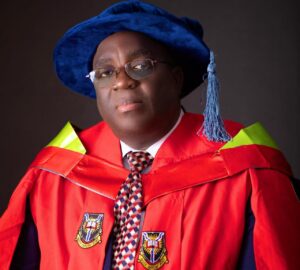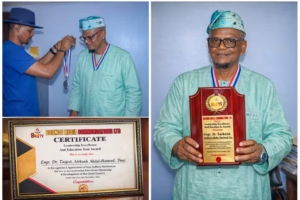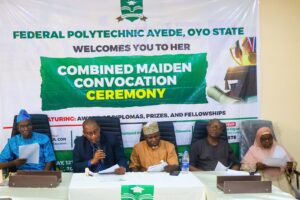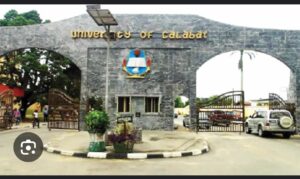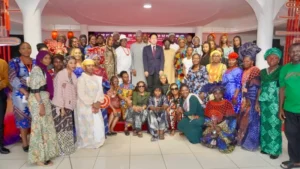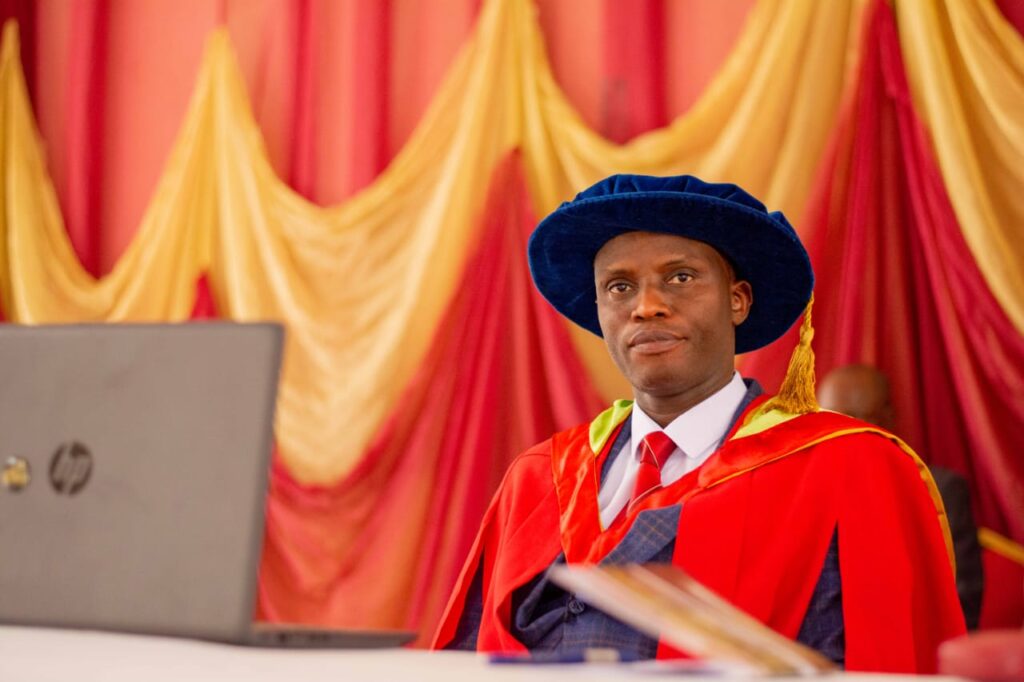
By Sunday Adepoju
The Dean of Faculty of Engineering, Ladoke Akintola University of Technology (LAUTECH), Ogbomoso, Engr. Professor Oladipo Seun Oladejo, has called on governments at all levels and other policy makers to maximize the nature’s valuable resources for environmental sustainability, including wastewater treatment.
Professor Oladejo decried that Nigeria relies on imported facilities for wastewater treatment, adding that materials for treating wastewater are readily available as bequeathed to humans by nature.
Oladejo, a Professor of Water Resources and Environmental Engineering at the Department of Civil Engineering, disclosed this while delivering the Institution’s 10th Faculty of Engineering and Technology Lectures Series titled “Tewétegbò in the Context of Photoremediation: The Wonders of Acquatic Plants (Macrophytes) in Constructed Wetlands for Wastewater Treatment” held at The Hall, LAUTECH yesterday, Thursday, February 13, 2025.
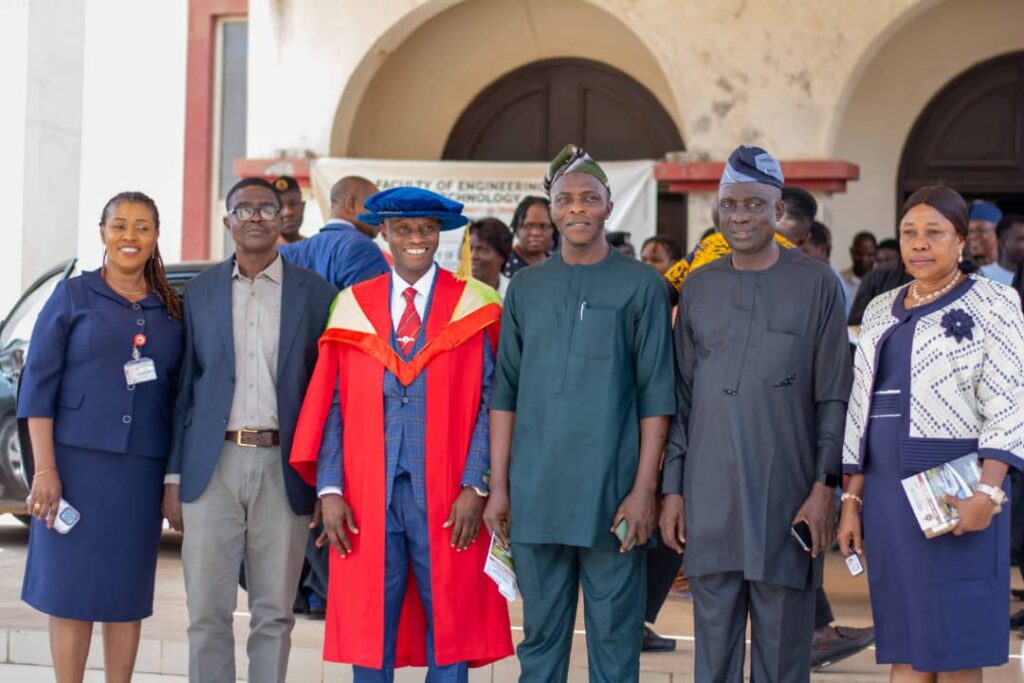
Oladejo highlighted the role of acquatic weeds in improving the efficiency of constructed Wetlands (called ‘àkùrọ̀‘ in Yoruba) and their potential as a nature-based solution for wastewater treatment.
According to him, aquatic weeds, scientifically referred to as macrophytes, are commonly found in various fresh water ecosystems, including lakes, rivers, and wetlands, adding that such plants have gained increasing attention for their ability to serve as a natural and sustainable solution for wastewater treatment.
He also noted that his adequate attention to the study area has revealed environmental, economic, social and public health benefits, as well as robust contribution to climate change mitigation.
He said the idea of choosing macrophyte-based constructed wetlands over conventional methods was due to cost-effectiveness and low operational requirements; natural and eco-friendly pollution removal, versatility among other water types; climate resilience and adaptability; biodiversity enhancement and habitat creation; public acceptance and aesthetic value; integration with other treatment technologies.
The Scholar analysed the power of healing through leaves, roots and stems as stated in holy books, including Ifa corpus.
“The fruits will be for food, and their leaves for healing (Ezekiel 47:12). Also in revelation 22: 2, ‘on each side of the river (wetlands) stood the tree of life, bearing twelve crops of fruit, yielding its fruits every month. And the leaves of the trees are for the healing of the nations.
“Quran 16: 69 (Surah An-Nahi, Yah 69 emphasises natural products’ healing properties, including those derived from plants. In the Ifa tradition, the use of plants and herbs (tewétegbò) for healing is central, as it is believed that Orunmila (the deity of wisdom and divination) provided procedures on using nature for well-being,” said Oladejo.
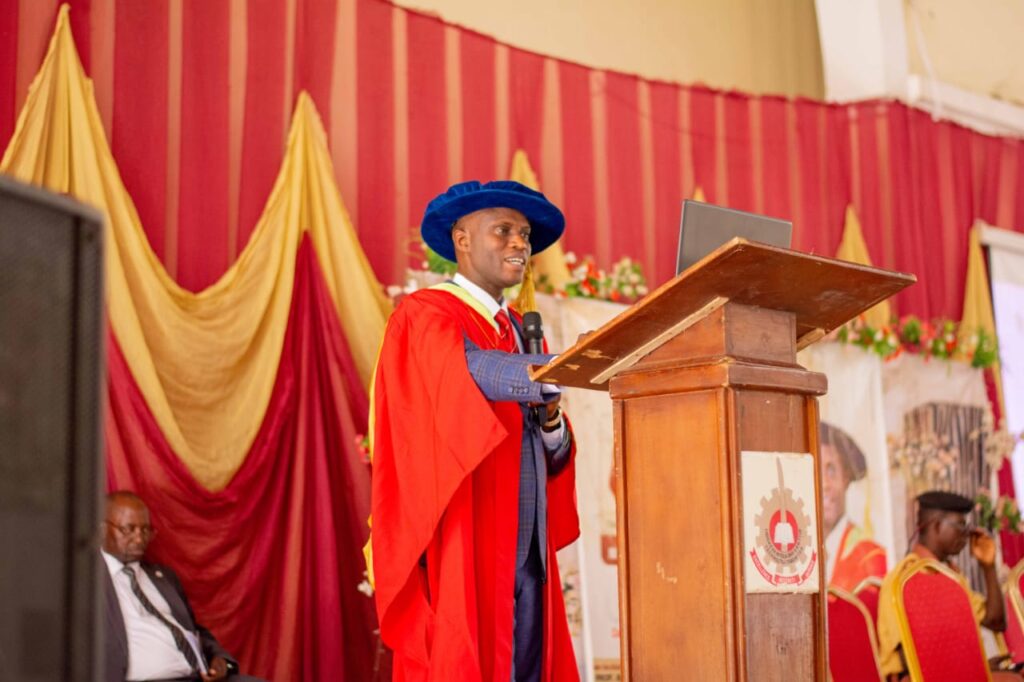
While speaking with PAN-NIGERIAN NEWS shortly after the lecture, Oladejo said, “The take home from this lecture is that we have valuable resources around us that could be used for the sustainability of our environment, including wastewater treatment. Most of the time, we rely on imported facilities which are very costly.
“Meanwhile, we have resources that are available and which can be used for the sustainability of our environment. So, this kind of lecture portrays the fact that we have resources that can be used to sustain our environment. They are low cost, available and sustainable because we can always see them around us without necessarily importing any of the resources.
“So, the lecture shows that our environment could be sustained by the natural resources that we have around us.”
He stressed that indigenous solutions are readily available.
“One of the necessities for lectures like this is that government may be looking at resources from advanced countries to solve our problems. But most of our indigenous problems can actually be solved using indigenous means. If the government will have interest in using our natural (indigenous) resources for environmental sustainability, it will help a lot in the recovery of some of our economic inputs.
“It is actually the part of the plants that are being used or known to be used for medicinal purposes. Using the roots, the leaves and the stem of plants, we try to let people know that the roots, leaves and stems are not only meant for medicinal purposes; they can also be used to treat wastewater. So, ‘tewe-tegbo‘ in medicinal world is useful in phytoremediation context.
“As a Civil Engineer and Professor of Water Resources and Environmental Engineering, my lecture covered other professions which means that we can integrate professions. We can collaborate to solve problems. As a Civil Engineer, my main work in the research is the construction of of the wetlands there. But my knowledge as an Environmental Engineer gives me an edge for the properties of plants that are used in treating the wastewater,” he stated.
While imploring academics and other professionals to engage in collaborative research, Oladejo said “I would tell my colleagues to go on collaborative research. My presentation today has encapsulated physics, chemistry, and biology. The multi-disciplinary angle has really made the presentation robust. If the government has interest and invites me, my major work as a Civvil Engineer will be the construction of wetlands. But as an environmentalist, I will be able to work with other professionals from chemistry, biology, physics, possibly in selecting other plants aside the ones that I have used for my work here.
“I got to understand all the Yoruba names of all these plants I used here because of my rapport with the elders and because of my studies and interest in pharmacognosy. I like to study about plants. I was telling my daughter this morning that the interest in the plants, including their indigenous names, was instilled in me by my teacher in nature study. So, he helped me through those weeds around and their names. Since that time, I created interest. Now, as a Professor, I can bring it even into my lecture.”
In the lecture, Oladejo, citing scholars, explained the concepts of Phytoremediation and and Root Zone Technology as follows: ” Phytoremediation is the process of using plants to remove, degrade, or stabilize environmental pollutants from soil, water, or air. This sustainable technology leverages the natural ability of certain plants to absorb and accumulate contaminants, making it a low-cost, eco-friendly approach to cleaning polluted environments.
“Root Zone Technology (RZT) is a natural wastewater treatment process that utilises the soil plant-microbe ecosystem to filter and treat contaminants from water. This method relies on interaction among plant roots, soil, and micro-organisms to break down organic and inorganic pollutants.”
The Scholar drew conclusion that the system, if practised, has the following benefits: high pollutant removal efficiency; ecological and environmental benefits; economic and social values; alignment with sustainable goals.
Oladejo recommended further studies to explore the full potentials of different macrophyte species in various types of wastewaters (industrial, agricultural and municipal).
He also recommended implementation in low-income areas, saying that the system could significantly improve sanitation and public health and reduce waterborne diseases.
Oladejo, who is also a Pastor, further harped on developing guidelines for designs and maintenance, supporting public awareness and training, encouraging integration with other technologies, monitoring long-term performance as well as investigating economic uses macrophyte biomass.
Among others, dignitaries at the event included the Vice Chancellor of LAUTECH, Prof. Razaq Olatunde ROM Kalilu, ably represented by DVC Strategy and Development, Prof. A. T. J. Ogunkunle; DVC Academic and Innovation, Prof. D.O. Araromi; Registrar, Mrs Olayinka Balogun, represrnted by Mrs. Olanike Adedosu; Bursar, Mr. Olusegun Olatokun; University Librarian, Mrs Adefunke Sarah Ebijuwa and the Chief host, Prof. Simeon Olutayo Jekayinfa.
The Presenter also offered his heartfelt appreciation to a number of personalities for immense efforts towards the success of the lecture.
He said, “I extend my appreciation to the University Management under the able leadership of the indefatigable and efficient Vice Chancellor, Prof. Razaq Olatunde ROM. Kalilu for granting approval for this 10th lectures series.
“I must also salute the unwavering commitment of our amiable Deputy Dean of the Faculty, Dr. K. K. Salam.
“The Chairman of the Organizing Committee for the Faculty Lectures Series, Dr. S.O. Adetola (MEE), and his team, including Engr. Dr. O.O. Awodoye (CPE), Engr. Dr. A.O. Alade (CHE), Engr. Dr. I.G. Adebayo (EEE), Engr. Dr. C.T. Oloyede (AGE), Engr. Prof. G.O. Ogunlakin (FDE), Engr. F.V. Onawumi (CVE) and and Mr. O.J Owolawi (Ag. Faculty Officer and secretary), for their instrumental roles in bringing this 10th lecture series to fruition.
“Your dedication to the behind-the-scene work did not go unnoticed and is deeply appreciated,. Their attention to detail and commitment behind the scenes has been indispensable. All Faculty Board members and entire faculty staff and students in attendance are appreciated. The Heads of Departments in this great Faculty of Engineering and Technology (FET) in persons of Professors: Oniya, O.O (AGE), Falohun, A.S (CPE), Ajani, A.O (CHE), Mudashiru, L.O (MEE), Oluremi, J.R (CVE), Adeyanju, J.A (FDE) and Okelola, M.O (EEE) for their unflinching supports in the smooth running of the affairs of the faculty and especially in making the lecure series a successful one are duly thanked.”

